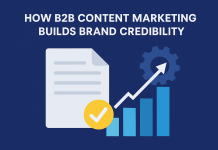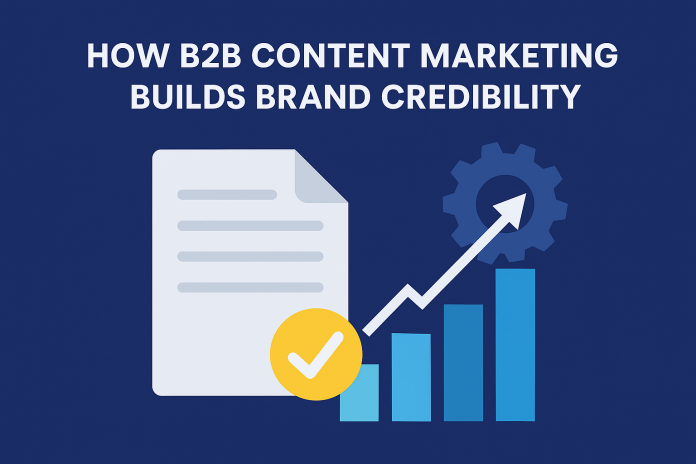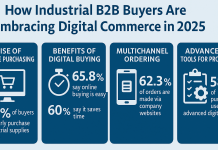B2B buyers increasingly base their decisions on thorough research and verified information.
Content marketing serves as a critical tool to provide these insights, helping brands establish authority and trust in the eyes of potential clients. By delivering consistent, factual, and relevant information through blogs, whitepapers, and case studies, businesses can influence decision-making and build long-term credibility in their industry.
A substantial majority of B2B decision-makers, specifically 81%, identify trust as a crucial element in their purchasing calculus. Concurrently, 67% of buyers indicate that vendors’ evaluations are significantly swayed by the presence of credible and informative content.
1. Content Builds B2B Trust and Authority
Content marketing is the primary mechanism for establishing trust and positioning your brand as an industry authority. It moves your company from being a mere vendor to a critical resource that helps buyers make informed, confident decisions.
- Elevate Expertise: Consistently publish well-researched, accurate, and relevant content to demonstrate deep industry knowledge.
- Establish Reliability: A regular publishing schedule across channels signals stability and commitment to the industry.
- Prioritize Education: Use a neutral, factual tone that emphasizes solving buyer pain points over self-promotion, inherently strengthening your credibility.
2. How Credible B2B Content Pre-Sells Your Brand
Credibility is what allows your content to do the heavy lifting of the sales process before a conversation even begins. Content marketing builds this asset by providing evidence-based, actionable guidance that addresses real buyer challenges.
- Show, Don’t Tell: Use original research, case studies, and verified statistics to back every claim.
- Focus on Measurable Outcomes: Shift from vague claims to discussing processes, methodologies, and clear, proven results.
- Practice Transparency: Openly discuss market realities, share potential challenges, and maintain clarity in your data presentation.
3. B2B Content Marketing Strategies to Build Credibility
- Educational, Long-Form Content: Whitepapers, eBooks, and guides provide depth and actionable insights.
- Use Verified Data: Reference credible sources such as Gartner, Forrester, or industry-specific research.
- Consistency Across Platforms: Maintain uniform tone, branding, and publishing schedule across all channels.
- Thought Leadership: Share original insights, analyses, and trend reports to establish authority.
- Transparency: Clearly explain processes, methodologies, and any limitations.
4. How Content Marketing Shapes B2B Brand Reputation
A strong B2B brand reputation is grounded in credibility. Content marketing directly influences how prospects and clients perceive a company’s reliability, expertise, and professionalism.
- Educational Value: Providing actionable insights positions the brand as a trusted resource.
- Consistency: Regular, high-quality content demonstrates market awareness and reliability.
- Engagement: Responding to queries and addressing industry questions builds accountability.
Companies with credible content achieve 54% higher client retention rates.
5. Why Credibility Matters in B2B Content Marketing
In B2B, purchasing decisions are high-value and risk-sensitive. Credibility reduces perceived risk and increases confidence.
- Reduces Purchase Risk: Buyers are more likely to engage with trusted vendors.
- Increases Conversion Rates: Credible content strengthens consideration and decision-making.
- Improves Retention: Long-term client relationships are maintained through trust.
- Encourages Referrals: Professionals recommend brands known for reliability and expertise.
6. Proven Ways B2B Content Marketing Builds Trust
Trust is the measurable outcome of credibility. Implementing best practices ensures content consistently reinforces authority.
- Publish Verified, Up-to-Date Content: Accuracy is critical for trust and authority.
- Leverage Subject Matter Experts: Expert-authored content increases confidence by 34%.
- Focus on Transparency: Clearly communicate methodologies, data sources, and processes.
- Use Data Visualizations: Infographics, charts, and research visuals improve comprehension and reliability.
- Maintain Consistent Tone and Style: Predictable communication signals professionalism and reliability.
Consistently applying these practices ensures that every piece of content strengthens B2B content marketing credibility, reinforcing trust and authority.
Conclusion
In B2B marketing, credibility is essential and measurable. Content marketing allows brands to demonstrate expertise, deliver actionable insights, and maintain transparency across the buyer journey.
Strategically executed B2B content marketing credibility helps brands shorten sales cycles, improve lead quality, and foster long-term relationships.
Every piece of content contributes to building trust, the key differentiator in today’s competitive B2B market.
I hope you found this content helpful. For more such information, visit B2B Reports.
FAQs
1. What is B2B content marketing credibility?
It is the trust and authority a brand earns by consistently providing accurate, relevant, and value-driven content.
2. How does content marketing build trust in B2B?
By delivering educational insights, verified data, and industry expertise that buyers rely on for decision-making.
3. Which content types increase credibility the most?
Whitepapers, case studies, research reports, and long-form blogs have the highest impact on trust.
4. How can credibility be measured in B2B content marketing?
Through engagement metrics, backlinks, repeat visitors, thought leadership recognition, and lead quality.
5. How often should B2B brands publish content for credibility?
Consistency and quality are more important than frequency. Regular updates with accurate, relevant information build long-term trust.










